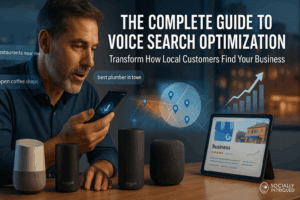The Complete Guide to Voice Search Optimization for Local Businesses
Published: May 2, 2025 |
By Socially Intrigued Digital Marketing and Social Media Agency Los Angeles | New York City
Introduction
“Hey Siri, find a coffee shop near me.”
“Alexa, what’s the best plumber in Chicago?”
“OK Google, where can I get Thai food delivery?”
If your local business isn’t optimized for these types of voice searches, you’re likely missing out on a significant number of potential customers. Voice search optimization for local businesses is no longer optional it’s essential for staying competitive in 2025. As voice search technology continues to evolve and gain popularity, it’s becoming increasingly important for local businesses to adapt their digital marketing strategies accordingly.
At Socially Intrigued, we’ve been helping businesses stay ahead of digital marketing trends for over 18 years. Our team of experts at our NYC and Los Angeles offices has witnessed the dramatic rise of voice search optimization and its impact on local businesses across the United States. In this comprehensive guide, we’ll share everything you need to know about voice search optimization for local businesses and how you can leverage it to boost your local business in 2025 and beyond.
Why Voice Search Optimization Matters for Local Businesses in 2025
Voice search isn’t just a passing trend—it’s fundamentally changing how consumers find and interact with local businesses. Effective voice search optimization for local businesses can lead to dramatic increases in discovery, engagement, and revenue. Consider these eye-opening statistics:
- Over 58% of consumers now use voice search to find information about local businesses online
- 76% of smart speaker owners conduct local searches at least once a week
- Voice-based searches are 3 times more likely to be local than text-based searches
- 28% of consumers call a business after finding it through voice search
- 88% of consumers who conduct a local search on their smartphone visit or call a store within a day
What makes voice search particularly valuable for local businesses is its natural alignment with local intent. When people use voice search, they’re often looking for immediate solutions in their vicinity—whether it’s finding a restaurant for dinner, locating the nearest hardware store, or searching for an emergency service provider.
How Voice Search Optimization Differs from Traditional SEO Techniques
Before diving into optimization strategies, it’s important to understand how voice search differs from traditional text-based searches:
1. Conversational Language
Voice searches are typically longer and more conversational. Instead of typing “best Italian restaurant NYC,” someone might ask, “What’s the best Italian restaurant in New York City that’s open right now?”
2. Question Format
Voice searches are often phrased as questions using who, what, where, when, why, and how. This natural language approach requires different content optimization strategies.
3. Mobile-First and On-the-Go
Most voice searches happen on mobile devices, often while people are driving, walking, or otherwise engaged. This creates an urgency that text searches might not have.
4. Featured Snippet Focus
Voice assistants typically pull answers from featured snippets (position zero) in search results, making this prime digital real estate even more valuable.
7 Essential Voice Search Optimization Strategies for Local Business Success
Now that we understand the importance of voice search optimization for local businesses, let’s explore the most effective strategies to optimize your online presence for voice search in 2025:
1. Google Business Profile Optimization for Voice Search
Your Google Business Profile (formerly Google My Business) is absolutely critical for voice search optimization. When someone asks for a business “near me” or in a specific location, voice assistants often pull information directly from Google Business Profiles.
Action steps:
- Claim and verify your Google Business Profile
- Ensure your business name, address, and phone number (NAP) are accurate and consistent
- Add detailed business information including hours, services, and categories
- Regularly update with photos, posts, and offers
- Actively manage and respond to reviews
- Use local keywords in your business description
2. Conversational Content Strategy for Voice Search Queries
Voice searches are typically phrased as questions, so your content should provide clear, direct answers to these questions.
Action steps:
- Create an FAQ page addressing common questions about your business, products, or services
- Structure content around long-tail, conversational keywords
- Use question-based headings (H2, H3) throughout your website content
- Provide concise, direct answers immediately following question headings
- Use natural language that mirrors how people actually speak
3. Local Voice Search SEO Fundamentals for Small Businesses
Voice search optimization builds on a strong local SEO foundation. Ensure you’ve covered these local SEO basics:
Action steps:
- Create location-specific pages if you serve multiple areas
- Include local keywords naturally throughout your website content
- Ensure consistent NAP information across all online directories and listings
- Embed Google Maps on your contact page
- Create local content (events, news, guides) relevant to your community
- Build local backlinks from community partners, chambers of commerce, etc.
4. “Near Me” Voice Search Optimization for Local Discovery
The phrase “near me” appears in countless voice searches, and its usage continues to grow as more consumers rely on voice search for local recommendations.
Action steps:
- Include location-based keywords in title tags, meta descriptions, and header tags
- Create content specifically addressing “near me” searches for your industry
- Ensure your website has location schema markup
- Make sure your site is mobile-friendly (Google uses mobile location data)
- Build out content that references local landmarks and neighborhoods
5. Featured Snippet Targeting for Voice Search Results
Voice assistants love featured snippets! According to recent studies, more than 50% of voice search results come from featured snippets, making them a prime target for voice search optimization.
Action steps:
- Research questions related to your business that trigger featured snippets
- Structure content with a clear question followed by a concise answer (40-60 words)
- Use numbered lists, bullet points, and tables where appropriate
- Include the question in an H2 or H3 tag followed by the answer in a paragraph
- Answer multiple related questions on a single page to increase relevance
6. Mobile-First Optimization for Voice Search Users
Voice search happens predominantly on mobile devices, making mobile optimization and site speed more important than ever.
Action steps:
- Ensure your website is fully responsive and mobile-friendly
- Optimize images and use modern formats like WebP
- Minimize HTTP requests and implement browser caching
- Use Accelerated Mobile Pages (AMP) where appropriate
- Achieve a PageSpeed score of at least 90 on mobile
- Test the mobile experience regularly across different devices
7. Schema Markup Implementation for Enhanced Voice Search Visibility
Schema markup helps search engines understand the context of your content, which is especially important for voice search.
Action steps:
- Implement LocalBusiness schema with complete information
- Add schema for hours, services, and products
- Use Review schema to highlight positive customer feedback
- Add FAQ schema for question-and-answer content
- Implement HowTo schema for instructional content
- Test implementation using Google’s Rich Results Test
Measuring Your Local Business Voice Search Optimization Success
Unlike traditional SEO, voice search success can be challenging to measure directly. However, there are several indicators that can help you gauge the effectiveness of your voice search optimization efforts:
1. Local Search Rankings
Monitor your rankings for conversational, question-based keywords and “near me” searches. While this won’t tell you specifically about voice search, it’s a good proxy.
2. Google Business Profile Insights
Increased activity on your Google Business Profile—including more calls, direction requests, and website clicks often correlates with better voice search visibility.
3. “Near Me” Traffic
Use Google Analytics to track traffic from searches containing “near me” or other location-specific phrases.
4. Branded vs. Non-Branded Traffic
An increase in non-branded traffic, especially from mobile devices, might indicate better voice search performance.
5. Phone Call Tracking
Since many voice searches lead to phone calls, implementing call tracking can help you attribute calls to voice search optimization efforts.
Common Voice Search Optimization Mistakes Local Businesses Should Avoid
As you optimize your local business for voice search, be careful to avoid these common pitfalls:
1. Ignoring Local Directories Beyond Google
While Google is dominant, don’t forget other platforms like Apple Maps, Bing Places, Yelp, and industry-specific directories that might feed voice search results.
2. Neglecting Mobile Optimization
If your site isn’t mobile-friendly, voice search users will bounce quickly, negating your other optimization efforts.
3. Stuffing Keywords Instead of Being Conversational
Natural language is key for voice search. Awkwardly stuffing keywords will hurt, not help, your voice search performance.
4. Overlooking Featured Snippets
If you’re not optimizing for featured snippets, you’re missing one of the most important aspects of voice search optimization.
5. Inconsistent NAP Information
Inconsistent business information across different platforms confuses search engines and reduces your chances of appearing in voice search results.
Voice Search Optimization Case Study: How We Helped a Local Restaurant Chain Increase Traffic by 43%
At Socially Intrigued, we recently worked with a mid-sized restaurant chain with locations across California and New York to improve their voice search performance. Here’s what we did:
- Identified voice search opportunities: We conducted extensive research to identify the most common voice queries related to their restaurant category.
- Optimized their Google Business Profiles: We completely revamped their GBP listings with consistent information, new photos, and targeted keywords.
- Created FAQ content: We developed comprehensive FAQ pages for each location addressing common voice search questions.
- Implemented schema markup: We added LocalBusiness, Restaurant, and Menu schema to provide rich data for voice search engines.
- Improved mobile experience: We optimized their mobile site speed and user experience to reduce bounce rates.
The results were impressive:
- 43% increase in website traffic from mobile devices
- 57% increase in “Get Directions” requests through Google Business Profile
- 38% increase in phone calls from search
- 27% overall revenue increase attributed to digital channels
The Future of Voice Search Optimization for Local Business Marketing
Voice search technology continues to evolve rapidly. Here are some trends we’re watching closely that will impact local businesses in the coming years:
AI-Powered Voice Search Personalization for Local Businesses
Voice assistants are becoming more personalized, making recommendations based on past user behavior. Businesses that collect and leverage customer data effectively will have an advantage.
Visual and Voice Search Integration for Local Marketing
The integration of voice and visual search is growing, with devices like Google Nest Hub and Amazon Echo Show combining voice commands with visual displays. This creates new opportunities for local businesses to showcase visual content.
Voice Commerce Growth
Voice-based shopping is expected to reach $80 billion annually, opening new opportunities for local businesses to capture sales directly through voice platforms.
Multi-Modal Search Experiences
Google’s AI advancements are creating more sophisticated search experiences that combine text, voice, and images. Local businesses need to optimize for all these modalities.
Conclusion
Voice search optimization is no longer optional for local businesses—it’s essential. With over 58% of consumers using voice search to find local businesses and the technology becoming more sophisticated every day, the time to implement voice search optimization for local businesses is now.
At Socially Intrigued, we’ve been helping businesses stay ahead of digital marketing trends for over 18 years. Our bicoastal team of experts in NYC and Los Angeles understands the unique challenges and opportunities that voice search presents for local businesses across all industries.
Ready to Optimize Your Business for Voice Search?
Contact us today to learn how we can help your business thrive in the voice search era.


